- Home
- Lisa McMann
Bang Page 2
Bang Read online
Page 2
“Tell me about it,” I say, and then I get a little shy, because here we are, in school, having hardly spoken to each other for years, and now we’re making out. In a way everything with Sawyer is so new and raw, but in another way, it feels like the most natural progression. We were so close before, and I still feel like I know him, you know?
“So . . . ,” I say, still tasting him on my lips. “Are we, like, going public with this? And if so, is that a good idea?”
He grins. “I’ve been thinking about that, and you know, Jules, I don’t want to hide it. But it’s up to you. If you feel like we need to because of your parents, I totally understand. Obviously.”
“What about your parents and your grandfather?”
Sawyer’s face sets. “Like I said in the hospital, I’m done playing along with their stupid game.”
“But—” Impulsively I reach out and brush my fingers across his cheekbone, imagining his grandfather beating him, and let my hand rest on his arm.
“He can’t hurt me anymore,” he says in a quiet voice, and I feel his biceps twitch through his sleeve. “Besides, I’ve got other shit to worry about.”
“Aaand there’s that,” I murmur, and turn to our lunch trays. I grab a few carrot sticks and blush when I bite down and they explode like firecrackers in the quiet room. “Ready to tell me?”
Sawyer’s eyes close and he lets out a resigned breath. He shakes his head the slightest bit, and then he opens his eyes and stares at the whiteboard in front of us. “I’m not exactly sure how to explain this,” he says. “I mean, I’m not sure what happened with you or how you saw your . . . your clues, or whatever. . . . ” He looks at me for help, and I realize I’ve never actually had a chance to describe to him what happened to me—I’d only told him that I saw a vision of a truck hitting his restaurant and exploding.
“The first time was at the movies,” I say. “Before the previews, when they have that ‘Turn off your cell phones’ ad. I saw a few seconds of the snowplow careening over the curb, smashing into your restaurant, and exploding. There was never any sound, just the picture. And then the Jose Cuervo billboard—it had a still shot of the truck explosion.” I hesitate as I relive it, having tried so hard to block it out. “Then I saw it on TV—and there was a new part added. Nine body bags in the snow. One of them was open, showing a face.”
I drop my head into my hand, not wanting to say the next part.
“A face?” he asks.
I nod and whisper, “Your face.”
He is quiet for a long minute. Then he stands up and shoves his desk right up to mine, moving our uneaten food to a different desk. He sits back down and we drape our arms around each other as I tell him the rest of it. I tell him about the gripping fear when I found out Angotti’s was closed that one Saturday night. All the times I drove past his restaurant to check if it was still there. The way I studied the scenes and tried to figure things out by the snow levels on the street. The vision’s growing frequency, intensity, and urgency until almost every place I looked was covered in the scene being played out. And my weird phone calls and visits to him, knowing there was no way he’d believe me, but having to do something about it.
When I finish, he nods slowly. And then he says, “Mine has sound. But not voices or street sounds or background noises. Eleven sounds, to be exact. All the same.” He makes a gun with his finger and thumb and points it at Mr. Polselli’s papier-mâché bust of Ivan Pavlov. “Bang.”
Five
My hand goes to my mouth. “A shooting?” I whisper.
His mouth twitches. “A school shooting.”
“Oh my God.” I look around the room as the shock of it hits home. “What, here? Our school?”
His Adam’s apple bobs and his eyes turn desperate. “I don’t know, Jules. I can’t tell where it is.”
“Tell me everything you can think of.”
“At first it was so quick I missed it. I remember thinking, ‘Wait, what just happened?’ and then brushing it off as me being tired. But then I started catching a glimpse of something out of the corner of my eye in the restaurant window, like there was a person standing there on the other side with his arms raised straight out, but whenever I’d look full on, he was gone.”
I rest my head against his shoulder and stay quiet, not wanting to interrupt.
“The next thing was the billboard. A still picture of a figure, arms raised and pointing straight ahead, firing a gun—muzzle flash and everything.”
I frown. “Muzzle flash?”
“When you pull the trigger of a gun, it ignites gunpowder, which explodes, pushing the bullet out. There’s a little flash of fire that comes out the barrel, but you can’t usually see it.”
“Why not?”
He shrugs and thinks about that for a minute. “Partly because it happens really fast. But also because there’s usually too much natural light, I guess.”
“Ah. So this vision of yours—it happens at night?”
He frowns. “Huh,” he says, and then he looks at me. “Maybe. You’re good at this.”
I give a sordid laugh. “Forced on-the-job training makes you an expert in a hurry. You’ll learn, kid. Stick with me.”
“No worries there,” he says, looking slightly relieved.
“So you’re only seeing stills? And you hear gunfire from them?”
“No, no sound from the stills. We have TVs in the restaurant bar, and not long after the billboard incident, when I was busing a table, I glanced at it and saw the same figure—person with a gun, arms outstretched, and he was stepping backward and swinging the gun wide, like he was feeling threatened. I stopped working and stared at it, and then the gunshots exploded in my head and I dropped my tray.”
I wince. “Was it dark?”
He hesitates. “Well, I could see the guy. Not his face—he was turned away. And I could see, um, bodies. But it wasn’t sunny or bright in there or anything.”
I knit my brows, thinking. “How do you know this guy is at a school?”
“I don’t know—it just looked like a school. It was all really fast—it felt . . . schoolish.”
“Yeah, okay,” I say, trying not to sound impatient. I remember how many hundreds of times I had to see mine before I caught everything. “You’ll get more information eventually.”
Just then somebody opens the door, sees us, and says, “Oops!” really loudly. I can hear people swarming the hallways. The dude closes the door again, and I glance at the clock. Four minutes until lunch is over.
Sawyer follows my gaze. “That went way too fast,” he says, getting up. He picks up the food trays and stacks one on top of the other like the server pro that he is, balancing them with one hand. “I guess I should get these back to the kitchen.”
I stand up too, grabbing a roll from the top tray and pulling a hunk off. “You should try to eat something,” I say. “You’re going to need the energy.”
He gives me a weary smile. “Does that mean it only gets worse from here?”
I nod, taking a bite of the roll.
“And it doesn’t end until . . . ?”
I swallow. “Until it’s over.”
We walk to the door and he pauses. “Wait a sec.” With his free hand he reaches into his pocket. “I hope this isn’t weird,” he says, “and you can say no and I won’t be offended or anything, but I can’t stand not being able to talk to you, especially with . . . this thing going on.” He pulls out a cell phone and hands it to me. “It’s just one of those cheap prepaid ones. No frills. Phone only.”
I take it, and it feels like I just got out of jail. “You are brilliant,” I say, turning it over in my hand, and then I look up at him and my heart swishes. “Thank you.”
“Don’t get caught.”
“I won’t.” I shove the phone into my pocket and reach up, thumbing the corner of his mouth until he gives me the smile I love. “I’ll call you tonight.” It’s amazing how nice it feels to be able to say that.
He hesitates,
his hand on the doorknob. “Jules?”
I look at him.
“In the vision, I don’t see any faces I know.”
“Oh.” I’m not sure what he’s trying to say. “Okay, well, that’s good, right?”
But that’s not what he means. He hesitates, and then he squeezes his eyes shut like he’s making the hardest decision of his life and says, “I was kind of wondering what happens if I don’t want to do this.”
Six
The bell rings before I can answer, and besides, the question is too much to absorb in ten seconds, so we say a hasty good-bye. All afternoon I think about what he said. And I wonder. If he doesn’t know or care about any of the people in the vision, does he have to do something? Is he legally obligated to do something? What about, like, morally?
My guess is that my vision probably would have gone away whether I saved people or not, but I didn’t know that back then. Does that change anything? I go back in time in my mind. If I knew that the vision would stop pounding me at every turn if I only waited long enough, would I have done what I did?
That one’s not hard. Sure I would have, because of Sawyer’s dead face in the body bag. But then I wonder how I would have looked at it had it been a stranger’s face. If every part of the vision stayed the same except Sawyer wasn’t going to be hurt or killed, would I have done what I did?
Not quite as simple, but the answer is still yes, because it was Sawyer’s family business, and chances were good that some family members filled the other body bags. And as much as we both are disgusted by our parents’ behavior—and I’m not talking just my dad’s affair with Sawyer’s mom, but also the ridiculous rivalry over a stupid sauce recipe—that doesn’t mean we want them to die, and I wouldn’t want Sawyer to go through that pain.
But what if I knew back then what I know now, and it wasn’t Angotti’s restaurant but some other restaurant somewhere else? If I knew that the visions would get worse and become insane, but I knew that it would end as soon as the crash was over, would I still risk my life to save those people?
I don’t think I know the answer.
• • •
In the evening, while everybody’s still down in the restaurant and I’m stuck doing mountains of worksheets and make-up quizzes that didn’t come home with one of the sibs, my mind wanders to it again. I pull out the cell phone, wondering if Sawyer is working, wondering if he’s slammed or if he maybe has time to talk.
I start pressing the numbers I know by heart but hardly ever get to use thanks to my father, and the phone’s address book recognizes them and brings up Sawyer’s name with a <3 next to it. I smile and look at it for a minute, and then I press the call button. It rings a few times, and I cringe. He’s probably busy.
“Hey,” comes his breathless voice.
Why is it that every time I talk to him I feel like my brain won’t work? It takes me a full second to form the word “Hi” in response. “Are you slammed?”
“Nope,” he says. “I just got back to the car. Delivered my last pizza for the night. How’s your new phone?”
“Love it,” I say. Love you. “Everybody else is still downstairs, but if I hang up quickly, you’ll know why.”
“I will always assume a quick click means the proprietors are coming, and not that you’re mad or something,” he teases.
“Oh, I’ll let you know if I’m mad.”
There’s a smile in his voice. “I do not doubt that. As long as every now and then you still drag me out of bed in the middle of the night to tell me you’re sorry I’m going to die, and tell me that you . . . ”
He doesn’t say it.
I don’t know what to say.
When you tell a guy you love him before you’re in a relationship with him, does it mean love love? Or just love? And what words do you use after you start the relationship? You can’t say “I love you” after a first kiss, I don’t care who it’s with. That screams of one of those crash-and-burn relationships half the school is in. I think I have to go back to saying “like.” For a while, at least.
“Anyway,” he says in the awkward pause.
“Anyway,” I agree. “So, um, I thought about your question.”
“Me too.”
“I guess all I can say is that I don’t think you have to risk your life for strangers.” And I stop there, even though there’s so much more I have to say. And want to say.
He’s quiet for a long moment. “What do you think will happen if I don’t try to save them?”
“The vision will get stronger and more frequent, and you’ll see it everywhere. You might not be able to drive—I was really struggling there at the end.”
“I’m so sorry—”
“Don’t. It’s really okay. I never expected you to believe me.” I pause, listening for footsteps on the stairs, but all is quiet. “The main thing you need to get you through it is to remember it’ll end eventually.”
“How do you know that for sure—that it’ll end?”
His question stops me. “Um . . . because it ended for me?” I say weakly.
“Yeah, but you did what it wanted you to do,” he says. “Will my vision still end if I don’t do what it wants?”
“I—I guess I don’t actually know.” I think about it, wondering if I’d still be tormented by the vision today if I hadn’t stopped the crash. If I’d have to look at Sawyer’s dead face in the body bag until the end of time. And for whatever reason, I think about my dad, and his own apparently tormented life. But Sawyer interrupts my thoughts.
“It’s getting worse,” he says. “As I’m driving around doing deliveries, it’s showing up on street signs.”
I frown. “Any new scenes?”
“Not so far. I’m going to try to watch some TV tonight to see if the vision shows up there. Try the rewind/slow motion thing like you said.”
I feel helpless. I sigh heavily and say, “I’m just so sorry about this.”
“Yeah, well, I blame you, of course.”
I afford a small smile, but I can’t help it. I feel responsible. This is happening because of me, and it’s, like, bodies and bodies—eleven gunshots? Holy shit. “So . . . you aren’t going to try to stop the shooting, then?” The words come out strained, because I’ve already made my decision on what has to happen if he decides not to save anyone. I’m going to have to save them myself.
He’s quiet. “Jules,” he says finally, sounding a little hurt. “Do you really think I could do that? I volunteer at the freaking Humane Society, you know. How could I possibly not try to save eleven people from some crazy gunman?”
My heart floods with relief. “I didn’t think you would—or could. I just didn’t want you to think I’d blame you for hoping to try and make it go away.”
“Well,” he says, “whatever controls this vision thing sure knows how to pick the right people to get the job done.”
I hear a door shut at the bottom of the stairs and my heart races. “Gotta go,” I say in a hushed whisper. “But I’m with you on this.”
“Thank dog for that,” he says, and we hang up.
Eleven fucking gunshots. And his vision is getting worse. I feel like I’m going to puke. All I know is that we gotta get moving on this thing. Now.
Seven
Mr. Polselli is back in his room at lunch, so Sawyer and I eat in the caf the rest of the week with Trey, but we don’t talk about the visions. Too many people around. There are a few fleeting moments at my locker and a few short phone conversations, but as the week progresses I get more and more stressed out by the fact that I barely get a chance to see Sawyer, much less talk about what he’s going through.
Add to that, I’m feeling guilty about still not going back to work. Plus I’m broke. And the sooner I get working, the sooner I’ll be able to do deliveries again now that I’m allowed to drive, which means I’ll be ungrounded and I’ll get a real cell phone that can do more than just make phone calls, and maybe Sawyer and I can arrange a few clandestine meetings. Not to me
ntion Rowan’s been working her face off covering for me. So I ease back into the work scene.
“It’s just like old times,” Trey says as we three head downstairs to the restaurant together Friday after school. Rowan is in a good mood too—she only has to get us through the dinner rush and make sure I’m cool with everything before she gets the night off to do who knows what.
And it’s pretty easy rolling back into it. My body gets tired a little sooner than it used to, and I’m not quite as fast as I’d like to be, but the cast doesn’t really get in the way too much and it’s actually getting me some pretty nice pity tips.
Trey is out most of the night with deliveries while Mom and I cover the tables and Aunt Mary works front of house. Dad’s having one of his depression days and hasn’t shown his face, which is actually kind of nice since we really aren’t talking right now.
In a lull, Mom joins me in prep and we roll silverware.
“Keeping up all right?” she asks.
“Yep,” I say.
“Good.”
It’s awkward between us, too. Ever since before the crash, I’ve thought Mom wanted to sort of confide in me—she did already, a little, when she told me she knew it wasn’t easy saying good-bye to an Angotti, and she wasn’t talking about herself. But she doesn’t know I know about Dad’s affair.
And the weird thing is, I don’t know what to do. Like now, we could talk if she wants to, I guess. “How’s everything going for you?” I ask. And I realize I never ask her this.
She tilts her head and smiles, seemingly pleased that I have put aside my selfish ways for the first time ever. “Not bad,” she says. “Old Mr. Moretti pinched my butt again. I think he’s going senile.”
“Maybe you’re just a hottie,” I say, grinning. “He never does that to me.”
“He’d better not or he won’t know what hit him. I don’t want you girls waiting on him.” She pauses and lightens up again. “If he weren’t senile I’d kick him out. But I haven’t been pinched in public since the nineties on the L.” She says it wistfully.

 Wake
Wake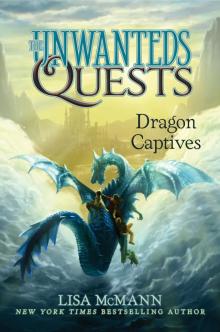 Dragon Captives
Dragon Captives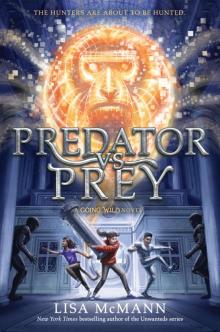 Project Chimera
Project Chimera Fade
Fade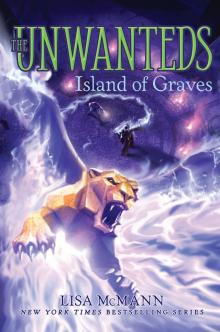 Island of Graves
Island of Graves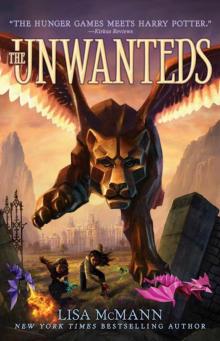 The Unwanteds
The Unwanteds Gone
Gone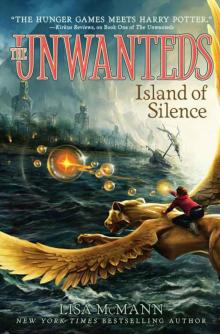 Island of Silence
Island of Silence Island of Legends
Island of Legends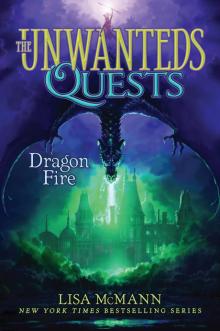 Dragon Fire
Dragon Fire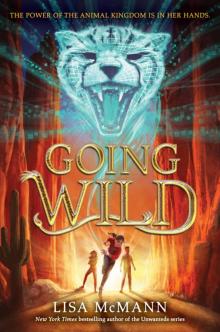 Going Wild
Going Wild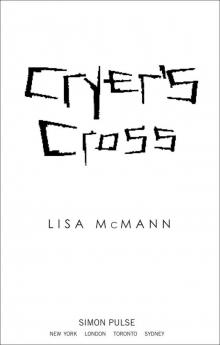 Cryer's Cross
Cryer's Cross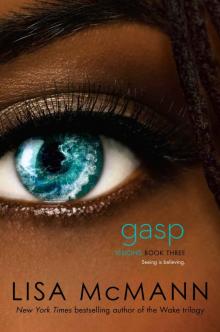 Gasp
Gasp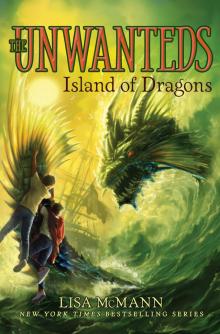 Island of Dragons
Island of Dragons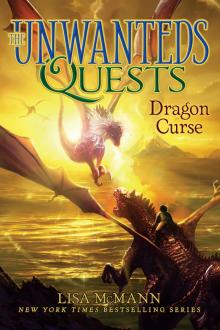 Dragon Curse
Dragon Curse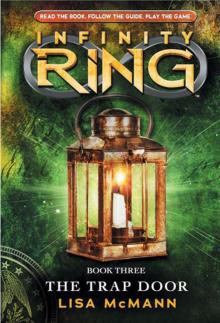 The Trap Door
The Trap Door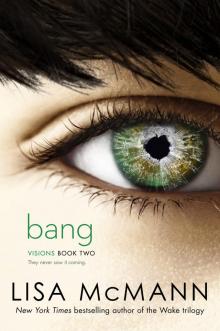 Bang
Bang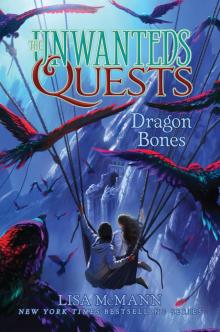 Dragon Bones
Dragon Bones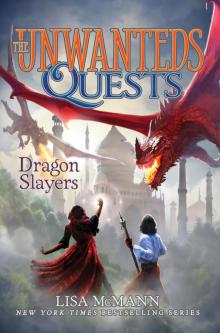 Dragon Slayers
Dragon Slayers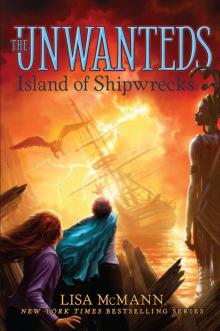 Island of Shipwrecks
Island of Shipwrecks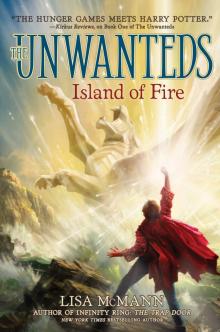 Island of Fire
Island of Fire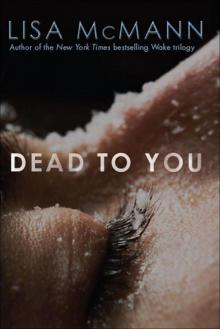 Dead to You
Dead to You Crash
Crash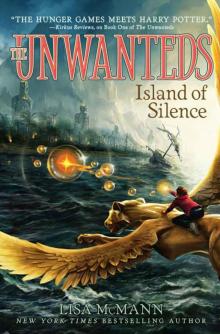 Island of Silence (Unwanteds)
Island of Silence (Unwanteds)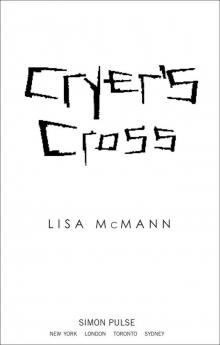 Cryer's Cross (Multimedia eBook Edition with Video)
Cryer's Cross (Multimedia eBook Edition with Video)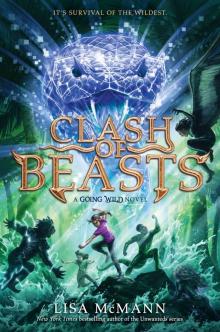 Going Wild #3
Going Wild #3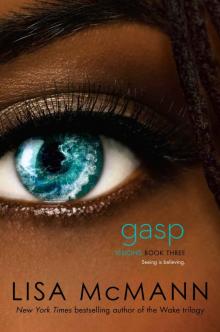 Gasp (Visions)
Gasp (Visions)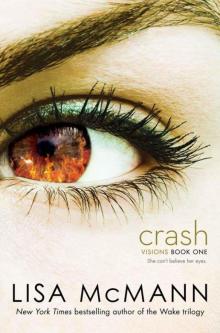 Crash (Visions (Simon Pulse))
Crash (Visions (Simon Pulse))